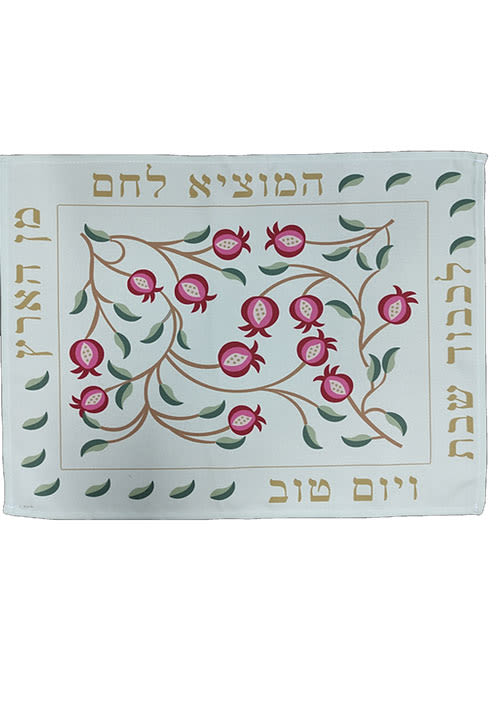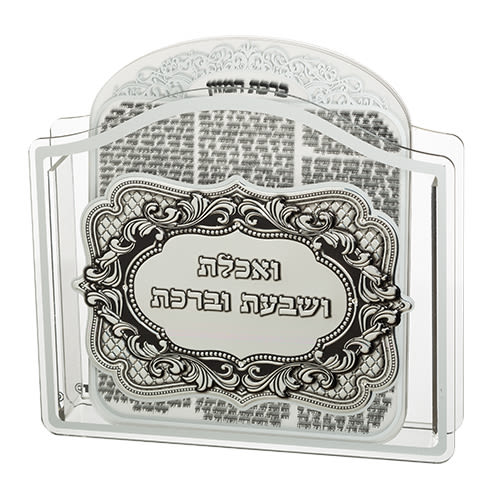
A Fortified Wall
Many people suffer similar difficulties. Despite learning, awareness, and prayer, they still feel that they have not experienced any significant change...

Translated by Rabbi Lazer Brody
In Forest Fields, Part 53
The four aspects of self composure
How is it possible that a person who prays for specific matters, such as a rectification of character flaws, does not merit any true improvement? And why is it that Rebbe Nachman teaches that the distance from Hashem that our world suffers from is due to a lack of self composure rather than due to insufficient prayer?
Without a proper attainment of self composure and clarity of thought, even prayer cannot be of full assistance. Prayer should draw our knowledge into our hearts, for the Torah commands: "And you shall know this day and consider it in your heart"(Deuteronomy, Chapter 4). In practical terms, if a person has failed to reach self composure and therefore remains confused and in doubt as to what the truth is, then he lacks knowledge! Without knowledge, what will he be able to draw into his heart through prayer? The best he will be able to do is to bring his confusion into his heart, and this surely will not help him to rid himself of anger or any other bad character trait, or to nullify any base desire. The person might be praying, but despite his prayer he perpetuates his uncertainty; this is exactly where the evil inclination strikes him.
On the other hand, if a person has achieved self composure and has clarified his understanding of things, then his prayers will facilitate the complete internalization of truth and clarity into his heart; this is absolute knowledge. When truth shines clear in his mind, clarity prevails in the heart. Subsequently, he’ll be able to act according to the truth that he now knows so clearly, for a person acts according to the knowledge internalized in his heart. He’ll be able to live according to this clarified truth and thereby immunize himself against the influence of the evil inclination.
A Fortified Wall
The hitbodedut that one devotes to self-correction resembles a wall that is erected for the purpose of protecting a city from enemies. Rebbe Nachman calls the mind a “wall”, for it is a partition against base desires. Prayer too is called a wall in that it protects from trials and tribulations. When a person is certain of the truth of things, he brings this clarity into his heart and fortifies this clarity with prayer, then he too erects a protective wall.

A wall that has no openings or cracks protects best. Yet, if this wall is breached in any way, namely, if one's self composure is incomplete, then his prayers won’t be effective. If he prays many prayers over an extended period of time, he may think that he has erected a thick and strong wall, but in essence he has in fact erected a wall full of cracks. These cracks represent all the unclarified points in his mind that he failed to internalize in the heart. Prayers aren’t effective with cracks in one’s wall of prayer. Through these cracks, the enemy invades his heart. Despite the apparent wall, he still fails again and again because of the breach, which is none other than lack of truth clarification, or self composure.
One who prays for something like overcoming anger, attaining marital joy, or guarding one's eyes and so forth must first be crystal clear about the importance and truth of what he’s trying to achieve. Once he attains that clarity, nothing can divert him from the path.
Let’s return to the original example we mentioned at the beginning of this chapter: A person can pray to overcome anger, and ask Hashem to protect him from feeling angry and acting out of anger. Yet, until he’s not fully convinced that getting angry is just as bad as the worst of transgressions, then he’ll still be prone to anger.
If he does sincere soul-searching and finds that he still justifies being angry in certain situations, then he hasn’t yet fully clarified the truth. As a result, he doesn’t pray to be cured of his anger in regard to all those situations that still appear make his anger justifiable. He will continue to pray only for those situations that he understands should not bring him to anger, and in those situations, he’ll succeed in refraining from anger. Yet, in connection to those circumstances that in his understanding still justify anger, he won’t feel that Hashem is helping him overcome his anger. In truth, he has not truly asked Hashem to help him overcome his anger in those particular situations because in his mind, they are not categorized as situations where he must avoid being angry at all costs.
If this person had already clarified the truth in his mind about what anger is, what the Torah teaches about anger, that no circumstance justifies an angry reaction, and that anger is an outright transgression, then he’ll be well on the way of ridding himself from anger.
One must work at clarifying his thought until he is above any doubt. He must feel with deep conviction that nothing justifies anger. Once he has composed himself well enough, he’ll have the clarity of thought that will enable him to act strongly and decisively. This is the strength that internalizes truth in his heart. In the case at hand, such a person will never be angry again!
One would be best advised to devote at least a half an hour daily praying for what he’s trying to attain. "Master of the Universe, have mercy upon me, help me comprehend in my heart that there is no situation in the world that justifies or permits me to be angry and no circumstance that makes anger worthwhile. Have pity upon me and help me, that my heart will not be tempted to become angry, not in this situation or in any other… It must be perfectly clear to me that if I am angry, I am transgressing. Help me identify my weakness and the way the evil inclination succeeds in enticing me to anger. Help me mend the crack in my emotional and spiritual wall that gives the evil inclination access to my heart and brain. Help me attain a strong and decisive conviction that I must not be angry no matter what, so I’ll resist any temptation to being angry.”
Each day’s hitbodedut must include a personal assessment of how he acted during the last 24 hours in regard to anger. Did the evil inclination succeed in tempting him? Did he discover an opening where the evil inclination could enter? If so, he must "close" that opening. In other words, he must make a firm decision to be more careful in similar situations in the future, and not be drawn into anger, praying daily for help and guidance in this area: “Master of the Universe, have mercy upon me and please help me avoid being angry in future test situations. Help me retain my self-composure and remember the truth, that anger is never allowed or justifiable.”
Usually a person fails repeated tests of anger in recurring situations such as in educating his children, in marriage, or at the workplace. One must examine the circumstances where he is susceptible to anger, where the evil inclination usually succeeds in tempting him. He can then clarify his thoughts in regard to these specific situations. He’ll subsequently be able to withstand the test the next time he is confronted with a similar situation. This is how one succeeds to attaining self-composure.
A person must acquire all four aspects of self-composure as Rebbe Nachman teaches: objective thought, clarification of the truth, inner strength, and conviction. If one of these four links is lacking, a person will not be able to pass the test of temptation and will inevitably fail. Rebbe Nachman describes self-composure as composed, strong, and forceful intelligence.
Here’s why the four aspects of self-composure are so important:
Objective thought – a person has no chance of ascertaining what’s right and wrong if he begins his self-assessment and personal pray subjectively.
Clarification of truth – once a person has obtained knowledge that results from learning about a particular subject and thinking about it objectively, he can apply it to day to day situations. For example, once a person learns about the damage of over-eating and eating what the body doesn’t need, he clarify the truth in his mind about whether or not he should eat pizza and drink beer.
Inner strength – once the truth is clarified, a person gains inner strength. When he knows that over-eating is not what Hashem wants him to do, he’ll regard overeating just like he regards eating a forbidden food.
Conviction – with inner strength, he won’t be tempted under any circumstance.
The composed, strong, and forceful intelligence of self-composure is the only means whereby a person can attain true character improvement. Without the self composure that includes the knowledge that results from objective thought, clarification of truth and unyielding conviction, he won’t fully succeed.
As shown in the abovementioned example of overeating, these principles are applicable not only in the rectification of all character traits, but in ridding ourselves of bodily appetites, bad habits, and lust as well. If one strives for self composure until he is clear and decisive about the matter at hand, if he prays frequently and practices self-evaluation, he will certainly attain a high level of teshuva and self-improvement.
Indeed, one of the most essential factors in reaching self composure is appreciating every time Hashem helps us succeed. For example, each time we successfully pass a test without failing, or improve in an area we’ve been working on, we should express our gratitude to Hashem. Gratitude invokes Divine assistance for further improvement.
Now we can understand why prayer is so ineffective when one lacks self composure. If he’s not decisive and strong, all his prayer will erect nothing more than an incomplete wall, full of holes through which his anger (or any other character weakness) enters again and again. One’s wall of self composure and truth clarification must be impenetrable to the evil inclination. Effective prayer depends on self composure.
To be continued.












Tell us what you think!
Thank you for your comment!
It will be published after approval by the Editor.